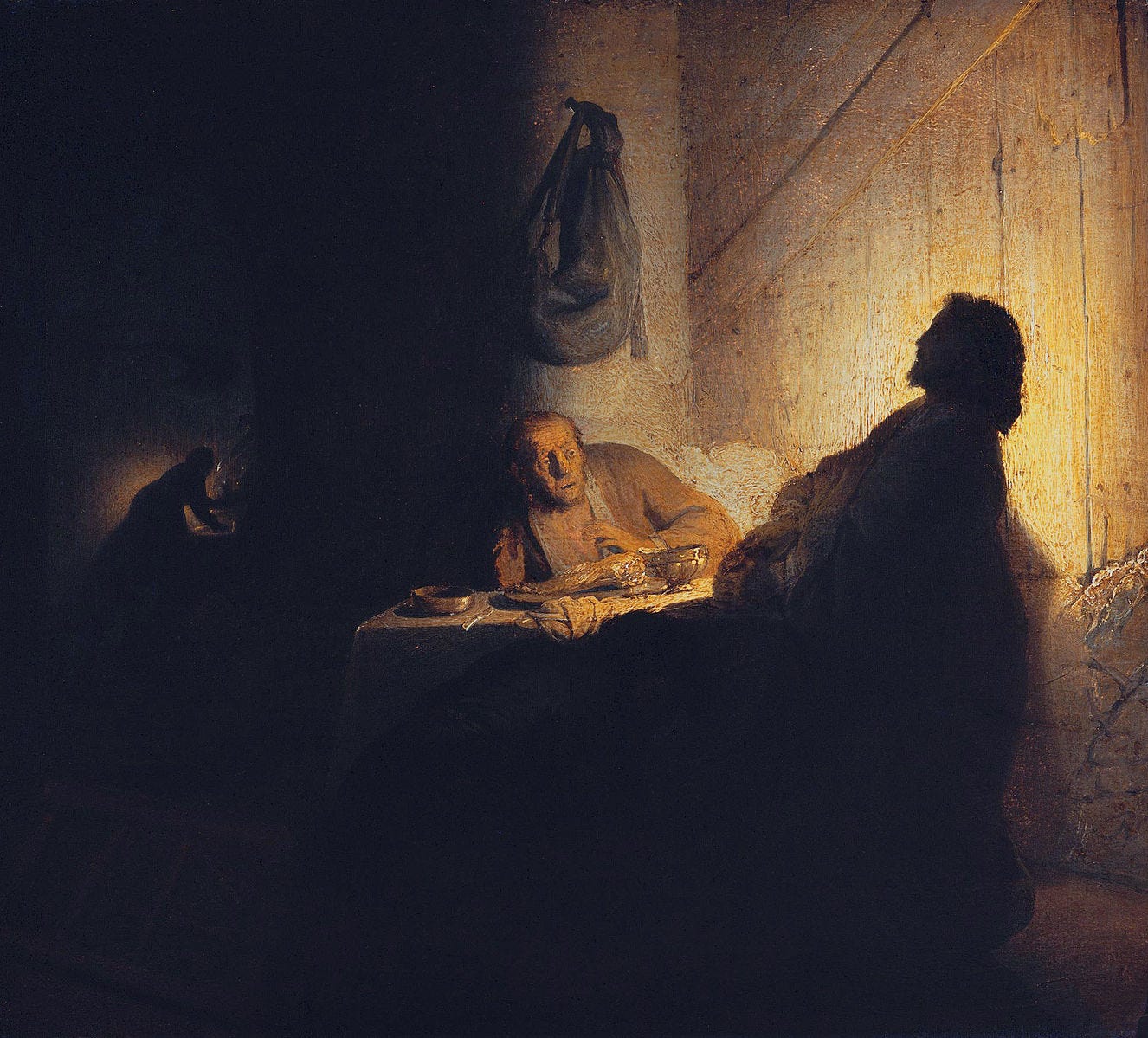The Resurrection encounter we just heard in today’s Gospel departs significantly from those which we heard last week. In John’s Gospel, Thomas the Apostle comes right out with his doubt: I will not believe unless… Until Thomas has proof, until he has seen and touched, he will not believe in the Resurrection. The disciples we meet in Luke’s Gospel on their way to Emmaus, however, evidence a different sort of unbelief. As they recount to the unrecognized Christ what has happened in these days, they don’t deny the Resurrection at all. Rather, they tell of the women’s witness of the angels and of the empty tomb as undisputed matters of fact. Why, then, do they walk away from Jerusalem and from the Risen Christ?
I want to make it clear that I’m entering into the realm of biblical speculation and that other interpretations are certainly possible. We have only what Luke has written about this encounter, and it’s up to us to color within the lines he has given. For me at least, the meaning of their departure from Jerusalem is implied here, in this verse: But we were hoping that he would be the one to redeem Israel. They do not doubt or deny what has happened — that Christ suffered, died, and was raised — nor do they deny that he was, in fact, the Christ promised and sent by God. What they doubt and deny is the relevance of what has happened to their lives — that this Christ has been for them. We were hoping, they confess, that he would be the one to redeem, to liberate, us. For them, this most probably meant that they expected him to drive out the oppressive force of the Roman Empire. But perhaps their hope was also more personal: that because of him their lives, more fundamentally, would not be the same. Their disappointment, manifest in the turning of their backs toward Jerusalem and the Risen Christ, stems from their resignment that life will go on as it ever was. Perhaps they assume that Christ will continue preaching, healing, and even raising the dead but none of this will matter because whatever Christ has done and will do does not seem to be for them.
I gave you the caveat that I was speculating because I’m aware that I’m reading my own experience into the narrative and, I suspect, yours as well. Luke’s story of the encounter on the road to Emmaus comes at the right time: two weeks after Easter Sunday, as the flowers have started to whither and the paschal joy has begun to wear off. It’s about that time when the proclamation of the Resurrection becomes a piece of old news and the “new life” to which we’ve been raised now tastes stale. We don’t doubt or deny that it happened. We instead wonder whether it did anything for us. Did our Lenten penances have any effect? Was our observance of Holy Week worth the effort? Are we any different than we were before? Has the Risen Christ really been raised for us?
Last Sunday here at the Basilica, Fr. Robert Imbelli spoke about Christ’s “pro-existence” and that idea has been on my mind this past week. The prefix pro means for. Christ’s existence is pro-existence, for he exists, simply, for others and not for himself. God the Eternal Son is begotten by the God the Eternal Father, from whom he receives all that he has and to whom he returns it. When God the Eternal Son becomes incarnate in the person of Jesus Christ, he maintains this quality of his being for. Christ does not his own will but the will of the Father who sent him (cf. Jn. 6:38). Christ does not seek to be served but to serve and to give his life as a ransom for many (cf. Mk. 10:45). Christ is always and everywhere for us, and this us is both collective and personal. It is only when the disciples recognize that Christ has walked with them and broke bread with them that they believe that he was truly for them. And they return to Jerusalem to find the other disciples who announce that Christ has been, too, for them, as he has appeared to Simon.
It is only when we recognize that Christ, too, has been for us that the mystery of his life can take effect in us. Only when we know that what he has done he has done for us will any of it matter. And in one sense, this recognition must always be first and foremost his initiative. He must seek us out, walking as we are from Jerusalem to Emmaus, and reveal himself as being for us. Yet we are not without means of encountering him. He has already taken the initiative to reveal himself to us through Sacred Scripture and through the Eucharist, both entrusted to the Church who uses both in her daily celebration of Christ’s Paschal Mystery. In the Mass, the Scriptures are opened and bread is broken for us — for our hearts to burn in the faith that Christ, who is with us, is for us, has ever been, and will ever be. For he is here, in our midst, in Word and in Sacrament, pledging himself yet again to us. And filled with the fire of his love for us, he sends us forth to announce to the world that God is for us in the person of Jesus Christ.
Homily preached April 22, 2023 at the Basilica of the National Shrine of the Assumption of the Blessed Virgin Mary




